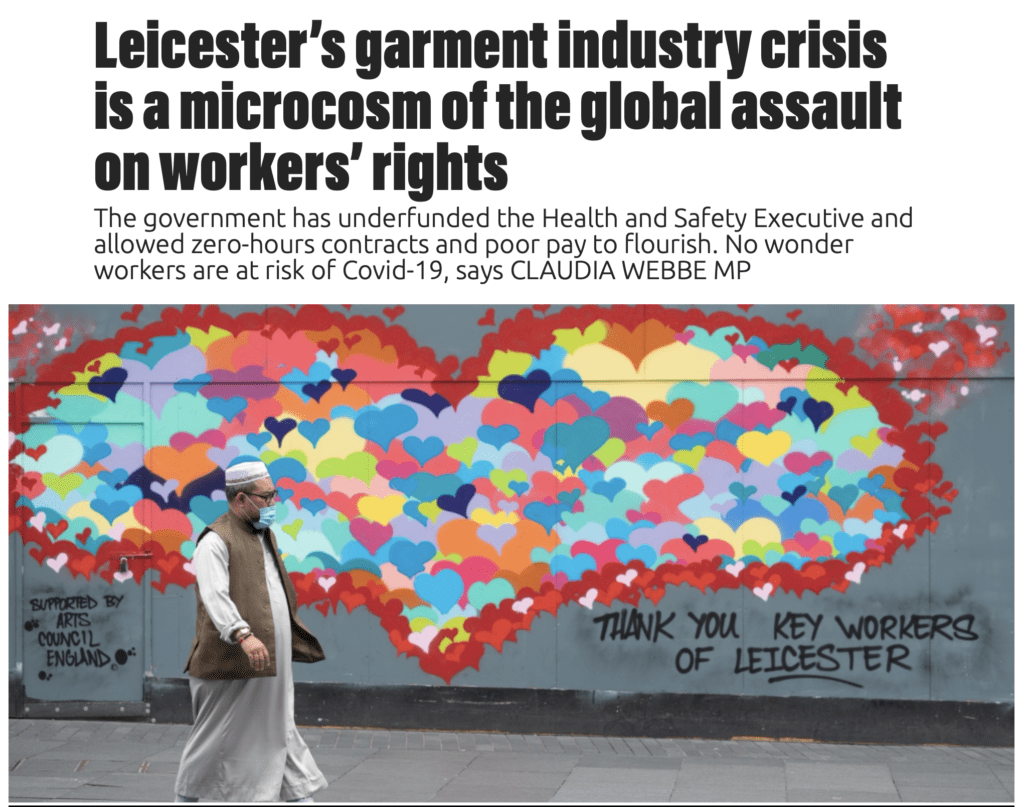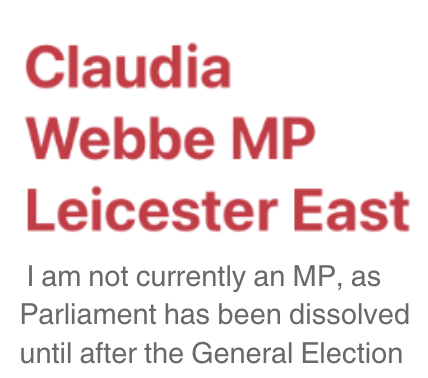
Leicester’s garment industry crisis is a microcosm of the global assault on workers’ rights.
By Claudia Webbe MP
The government has underfunded the Health and Safety Executive and allowed zero-hours contracts and poor pay to flourish. No wonder workers are at risk of Covid-19, says Claudia Webbe MP
WHEN I was elected as member of Parliament for Leicester East, ending workplace exploitation was — and remains — one of my most important priorities.
Leicester has the largest number of garment workers in the UK. There are an estimated 1,500 garment manufacturing businesses in the city, employing around 10,000 people, the majority of whom are women from migrant communities.
A recent study by HM Revenue and Customs found that, over a six-year period, a quarter of all UK textile factories caught failing to pay the minimum wage were based in Leicester, with some textile factories reportedly offering less than £3.50 an hour.
This has been an “open secret” for far too long and has been brought to official attention over many years.
Instead of dealing with the issue, the government introduced austerity, underfunded the Health and Safety Executive and allowed zero-hours contracts and poor pay to flourish while rejecting every single recommendation from a select committee report that could have addressed the problem.
The tabloids, meanwhile, were demonising migrants. It is this combined power of the political elite, media and big business that has created and sustained this disaster capitalism where the working class, including migrant communities, become collateral damage.
It is important to understand the conditions that led us to this position and situation in Leicester.
An online shopping boom and unsafe, cramped working conditions with a lack of personal protective equipment (PPE) have created a perfect storm for Covid-19 transmission rates to rise.
I have been contacted by many workers in Leicester East regarding several Leicester garment manufacturers which, it is claimed, are operating unethically, paying poverty wages and without due regard to health and safety.
Many of the workers who approached me for help have an immigration status of no recourse to public funds (NRPF), are ineligible to access statutory sick pay and are employed by firms that have no union recognition and where health and safety measures have not been implemented.
Leicester is home to many undocumented workers with NRPF, for whom it is impossible to survive without attending work, often in unsafe conditions.
This crisis has demonstrated the need for unionised, accountable workplaces that prioritise employee wellbeing.
All workplaces must adhere to health and safety measures, and nobody in Leicester or elsewhere in Britain should be forced to work in unsafe conditions.
The government must ensure that everyone, regardless of their immigration status, can afford to stay safe during the continued lockdown.
Leicester’s garment industry crisis is a microcosm of the global assault on workers’ rights.
We must celebrate all the rights that the labour and trade union movement has fought for and won.
From fairer pay to weekends, everything that makes the lives of workers tolerable has been won by generations of struggle.
Yet over the last decade, trade unions have been under siege from the Conservatives.
The government must prove that it prioritises public health over private profit by beginning to take workers’ rights seriously.
That means removing unfair and unnecessary restrictions on trade unions, allowing people to come together and speak up on issues that affect them at work.
It also means they must repeal anti-trade union legislation, including the Trade Union Act 2016, and create new rights and freedoms for trade unions to help them win a better deal for working people.
A recent investigation undertaken by Labour Behind the Label found evidence that conditions in Leicester’s factories, primarily producing for Boohoo, are putting workers at risk of Covid-19 infections and fatalities.
Sales of clothes made by suppliers in Leicester have helped fuel a rapid growth that could reward Boohoo’s bosses, including a billionaire, with bonuses worth £150 million as part of a three-year incentive scheme.
It is appalling that the exploited labour of residents of Leicester East is helping to finance such extravagant corporate salaries.
This demonstrates the stark inequality that exists in our society and is proof that the obscene wealth of billionaires is built on the exploitation of the working class.
A wealth tax to make billionaires pay their fair share could not come sooner.
Recent media reports suggest that some garment manufacturers in Leicester have vowed to defy the city’s local coronavirus lockdown, protesting that they cannot afford to lose any more money even if it means putting lives at risk.
One small business owner said: “I know coronavirus can kill but so can hunger and that’s why all of us need to continue working.”
This demonstrates the dire circumstances facing much of the beleaguered working class in Britain.
The coronavirus pandemic has torn further holes in a social fabric that was already stretched to breaking point.
This virus has demonstrated that we have a moral duty to ensure that everyone across Britain is protected.
After this crisis, Leicester can no longer be known as the sweatshop of Britain. The government must prove that it prioritises public health over private profit by taking workers’ rights seriously.
Claudia Webbe MP is the member of Parliament for Leicester East. You can follow her at www.facebook.com/claudiaforLE and twitter.com/ClaudiaWebbe


